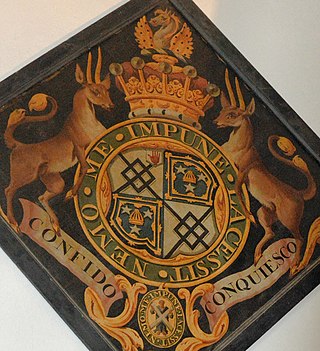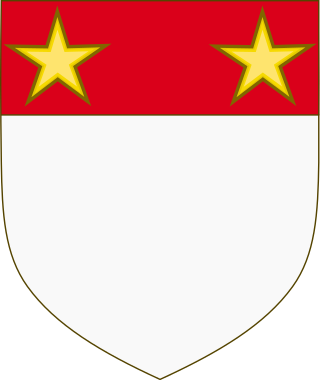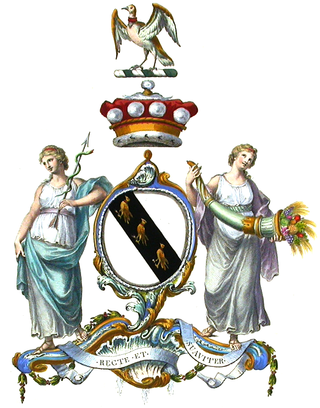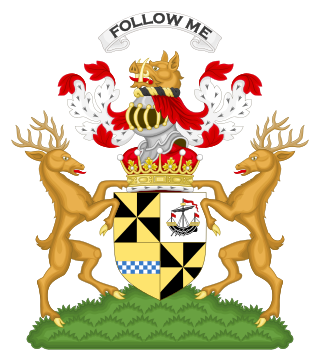
Earl of Dysart is a title in the Peerage of Scotland. It was created by King Charles I in 1643 for William Murray and has been held continuously since then by his relatives.

Baron St John of Bletso, in the County of Bedford, is a title in the Peerage of England. It was created in 1582 for Oliver St John.

Earl of Stradbroke, in the County of Suffolk, is a title in the Peerage of the United Kingdom. It was created in 1821 for John Rous, 1st Baron Rous, who had earlier represented Suffolk in the House of Commons.

Viscount Hawarden is a title in the Peerage of Ireland.

Viscount Hill, of Hawkstone and of Hardwicke in the County of Salop, is a title in the Peerage of the United Kingdom. It was created in 1842 for General Rowland Hill. He had already been created Baron Hill, of Almaraz and of Hawkstone in the County of Salop, in 1814, with remainder to the heirs male of his body, and Baron Hill, of Almarez and of Hawkestone and Hardwicke in the County of Salop, in 1816, with remainder to the heirs male of his elder brother John Hill. The viscountcy was created with the same special remainder. On the first Viscount's death in 1842, the barony of 1814 became extinct as he had no male issue, while he was succeeded in the barony of 1816 and the viscountcy according to the special remainders by his nephew Sir Rowland Hill, 4th Baronet. His son, the 3rd Viscount, sat as a Conservative Member of Parliament for Shropshire North. In 1875, he assumed by royal licence the additional surname of Clegg, which was that of his maternal grandfather. He inherited financial problems from his father which led to the breakup and sale of the family estates.

Viscount Ridley is a title in the Peerage of the United Kingdom. It was created in 1900 for the Conservative politician Sir Matthew White Ridley, 5th Baronet, Home Secretary from 1895 to 1900. He was made Baron Wensleydale, of Blagdon and Blyth in the County of Northumberland, at the same time, also in the Peerage of the United Kingdom. The latter title was a revival of the barony held by his maternal grandfather James Parke, Baron Wensleydale, whose title became extinct upon his death since none of his sons survived him.

Viscount Scarsdale, of Scarsdale in Derbyshire, is a title in the Peerage of the United Kingdom. It was created in 1911 for the prominent Conservative politician and former Viceroy of India George Curzon, 1st Baron Curzon of Kedleston, who was created Earl Curzon of Kedleston at the same time and was later made Marquess Curzon of Kedleston.

Baron Stanley of Alderley, in the County of Chester, is a title in the Peerage of the United Kingdom. It was created in 1839 for the politician and landowner Sir John Stanley, 7th Baronet.

Baron Hesketh, of Hesketh in the County Palatine of Lancaster, is a title in the Peerage of the United Kingdom. It was created in 1935 for Sir Thomas Fermor-Hesketh, 8th Baronet, who had previously briefly represented Enfield in the House of Commons as a Conservative. As of 2010 the titles are held by his grandson, the third Baron, who succeeded his father in 1955. Lord Hesketh held junior ministerial positions in the Conservative administrations of Margaret Thatcher and John Major. However, he lost his seat in the House of Lords after the House of Lords Act 1999 removed the automatic right of hereditary peers to sit in the upper chamber of Parliament.

Baron Poltimore, of Poltimore in the County of Devon, is a title in the Peerage of the United Kingdom. It was created in 1831 for Sir George Bampfylde, 6th Baronet. His son, the second Baron, held office as Treasurer of the Household from 1872 to 1874 in the first Liberal administration of William Ewart Gladstone.

Earl of Breadalbane and Holland is a title in the Peerage of Scotland. It was created in 1681 for Sir John Campbell, 5th Baronet, of Glenorchy, who had previously been deprived of the title Earl of Caithness. It refers to Breadalbane, Scotland, a region of the southern/central Scottish Highlands, within the Grampian Mountains range, archaically spelt Broadalbin.
Baron Harvey of Tasburgh, of Tasburgh in the County of Norfolk, is a title in the Peerage of the United Kingdom. It was created on 3 July 1954 for the diplomat Sir Oliver Harvey on his retirement as British Ambassador to France. In November the same year he also succeeded his half-brother as fourth Baronet of Crown Point.
Events from the year 1655 in Ireland.
There have been six baronetcies created for persons with the surname Newton, three in the Baronetage of England, one in the Baronetage of Nova Scotia and two in the Baronetage of the United Kingdom.
Events from the year 1655 in England.
Sir Thomas Lyttelton, 4th Baronet, of Frankley, in the County of Worcester, was an English landowner and Whig politician who sat in the House of Commons from 1721 to 1741. He held office as one of the Lords of the Admiralty from 1727 to 1741.

There have been two baronetcies created for persons with the surname Lennard, one in the Baronetage of England and one in the Baronetage of the United Kingdom. Both creations are extinct.
Price Hartstonge (1692–1744) was an Anglo-Irish politician who sat in the Irish House of Commons as MP for Charleville from 1727–44.
Sir Edward Crofton, 2nd Baronet was an Irish landowner and politician, who sat in the Irish House of Commons for more than thirty years, and served briefly as a member of the Privy Council of Ireland.
Ashcombe is a village and civil parish in the Teignbridge district of Devon, England.










